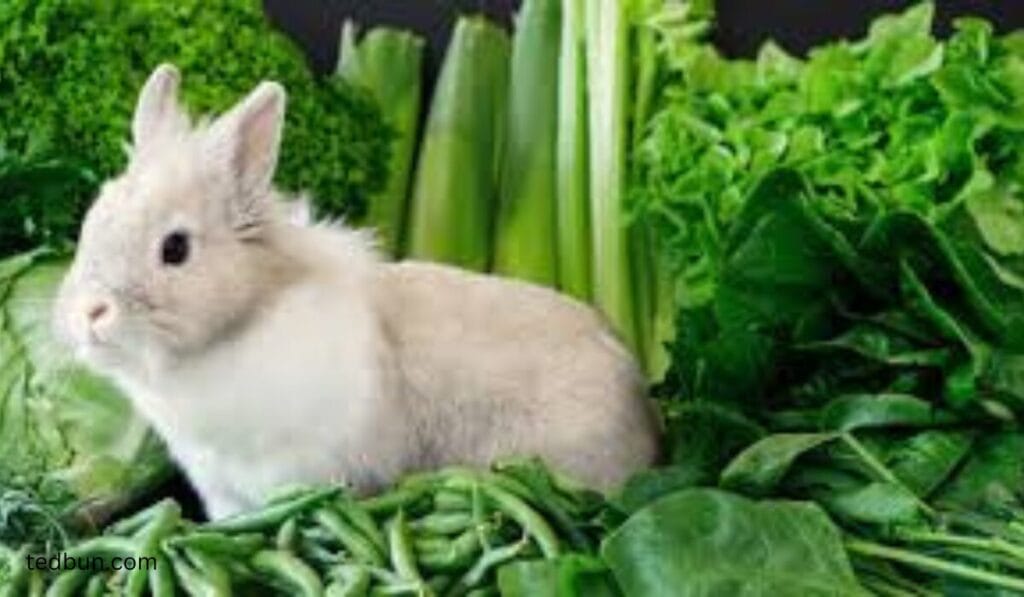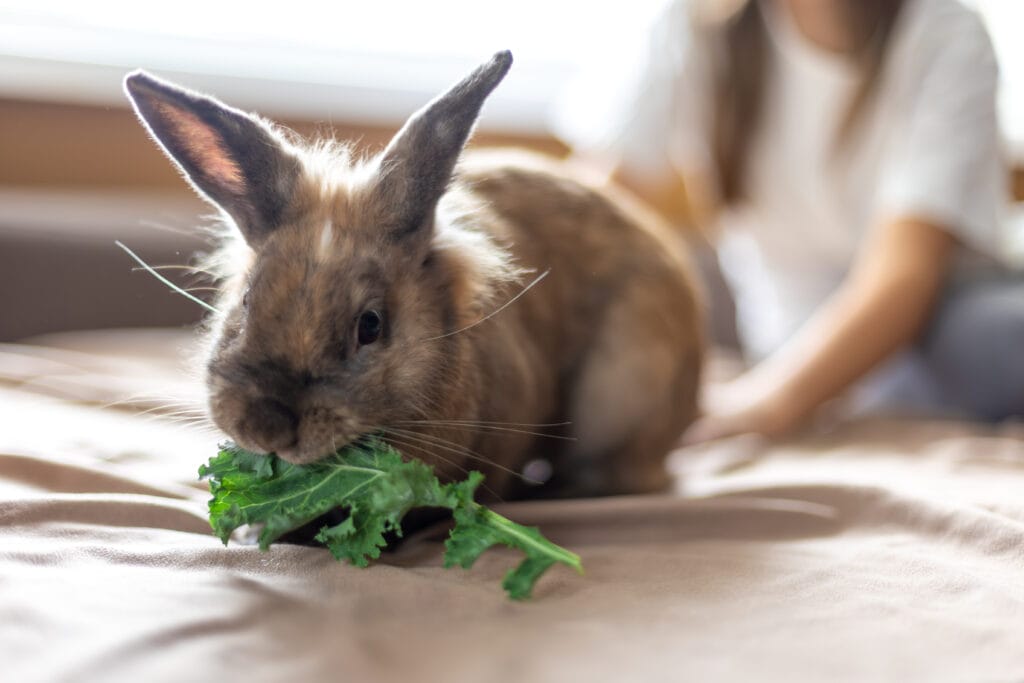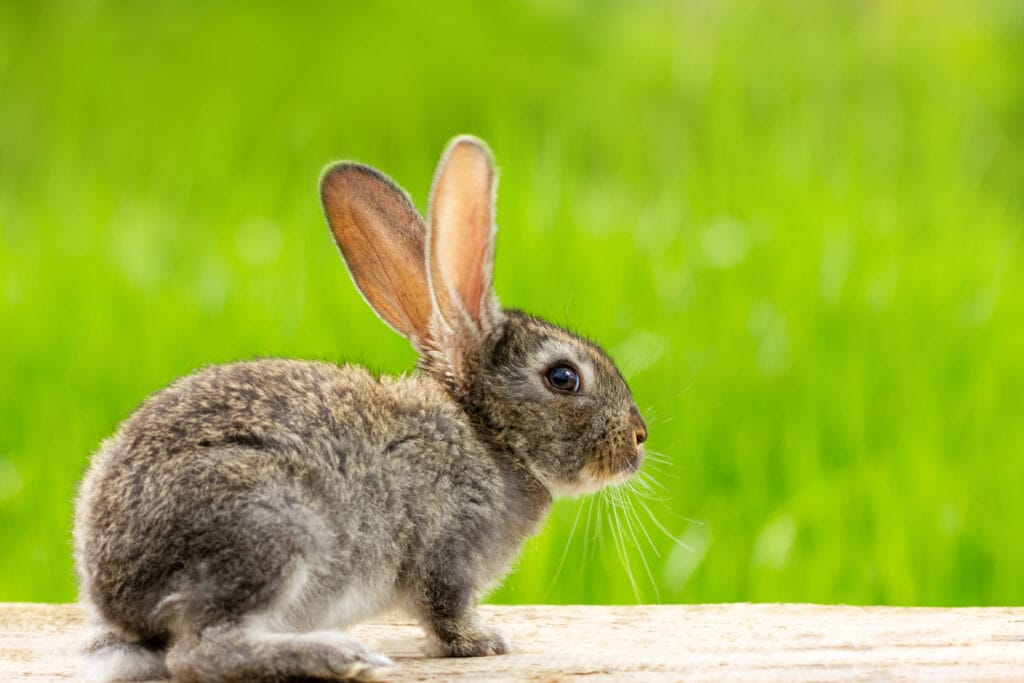Ever wondered if your bunny can munch on green beans without a hitch? I sure have, staring at my fluffy friend while holding a handful of those crisp veggies. The question, “Can rabbits eat green beans?” pops up a lot among pet parents. We want our rabbits to enjoy tasty treats while staying healthy. Green beans can be a fun addition to a rabbit diet, but there’s a catch. I’ll walk you through their nutritional perks, hidden risks, and how to serve them right. From portion sizes to prep tips, this guide covers it all to keep your bunny hopping happily.
Are Green Beans Safe for Rabbits?
Yes, they’re safe in small amounts
I’ve tossed a green bean to my rabbit, Thumper, and watched him nibble with glee. So, can rabbits eat green beans? Yes, they’re safe in small amounts. Green beans aren’t toxic, which is a relief for us bunny parents. But here’s the deal: rabbits have a sensitive rabbit digestive system. Too many green beans can cause gas or even gastrointestinal stasis, a serious issue where the gut slows down. Vets agree that green beans are fine as occasional rabbit treats, but they shouldn’t be a daily snack. The House Rabbit Society notes that veggies like green beans should make up only a small part of a rabbit diet, with hay being the star. Keep portions tiny to keep your bunny’s tummy happy.
Nutritional Benefits of Green Beans for Rabbits
Green beans pack a punch of rabbit nutrition. They’re loaded with rabbit food nutrients like fiber, vitamin C, and potassium. These goodies help keep your bunny in tip-top shape. Fiber supports the rabbit digestive health, keeping things moving smoothly. Vitamin C boosts the immune system, which is great since rabbits can’t make it themselves. Potassium helps with muscle function, so your bunny can keep zooming around. But green beans aren’t the main event in a rabbit diet plan. They’re more like a fun side dish. A 2023 study from the Journal of Animal Nutrition found that green beans provide about 2.7g of rabbit food fiber per 100g, which is decent but less than hay’s 30g. So, they’re a nice boost, not a replacement for a hay-based diet.
How Fiber Supports Rabbit Digestive Health
Fiber is a rabbit’s best friend, and green beans bring some to the table. In a rabbit digestive system, fiber keeps the gut moving, preventing scary issues like gastrointestinal stasis. I learned this the hard way when Thumper got a bit chubby from too many treats. Green beans have rabbit dietary fiber that helps control weight and keeps digestion smooth. Unlike hay, which is the king of rabbit food fiber at 80% of their diet, green beans offer a smaller dose. Think of them as a crunchy bonus. They encourage chewing, which is great for gut motility. Just don’t overdo it, as too much can lead to rabbit digestive issues.
Key Vitamins and Minerals in Green Beans
Green beans are like a vitamin pill for bunnies, but tastier. They’ve got rabbit food vitamins like vitamin C, which supports rabbit health by boosting immunity. Rabbits need about 10mg of vitamin C daily, and 100g of green beans offers around 12mg. Then there’s rabbit food potassium, about 211mg per 100g, which keeps muscles working right. Rabbit food magnesium and rabbit food calcium also pop up in small amounts, aiding bones and nerves. These rabbit food minerals align with what bunnies need, but they’re not a full meal. I mix green beans with other rabbit-safe vegetables to keep Thumper’s diet balanced.
| Nutrient | Amount per 100g of Green Beans | Benefit for Rabbits |
|---|---|---|
| Fiber | 2.7g | Supports digestion |
| Vitamin C | 12mg | Boosts immunity |
| Potassium | 211mg | Aids muscle function |
| Calcium | 37mg | Strengthens bones |
Risks of Feeding Green Beans to Rabbits
Feeding rabbits green beans sounds fun, but there’s a catch. Too many can upset a rabbit digestive system. I once gave Thumper a few extra beans, and he got bloated. Green beans, being legumes, are harder to digest than leafy greens like romaine lettuce. They can cause gas, which leads to rabbit digestive issues like diarrhea or even gastrointestinal stasis. This condition is no joke—it can stop a bunny’s gut entirely. A 2022 veterinary report from PangoVet warns that legumes like green beans should be limited to avoid these risks. Stick to small amounts to keep your bunny safe.
Why Overfeeding Green Beans Causes Problems
Rabbits have a unique rabbit digestive system that’s picky about what it handles. Green beans have complex rabbit food carbohydrates that ferment in the gut, causing gas. This can lead to bloating or worse, gastrointestinal stasis. I’ve seen Thumper get sluggish after too many treats, a sign something’s off. Look for reduced appetite, small or no poops, or a hunched posture—these scream rabbit digestive issues. Unlike rabbit-friendly vegetables like parsley, green beans need careful portioning. Vets say legumes should be less than 5% of a rabbit’s daily intake to avoid trouble.
How to Introduce Green Beans to Your Rabbit’s Diet
Wondering how to start feeding rabbits green beans? I was nervous the first time with Thumper. Start small—one bean, chopped up. Watch your bunny for a day or two. Check their poop; it should stay round and firm. If they seem fine, you can slowly increase the amount. This rabbit food introduction helps avoid rabbit digestive issues. I learned to keep an eye on Thumper’s energy levels too. If he’s less hoppy or his appetite drops, I pause the green beans. The RSPCA suggests introducing new rabbit-safe foods over a week to be safe.
Ideal Portion Sizes for Green Beans
Portion size matters when you ask, “Can rabbits eat green beans?” I stick to one or two beans per 4 pounds of Thumper’s weight, about twice a week. This keeps his rabbit food portion size in check. Vets recommend green beans make up no more than 5% of a rabbit’s daily meal. Compared to leafy greens like kale, which can be fed daily, green beans are a rarer treat. Overdo it, and you risk rabbit digestive health issues. A balanced rabbit diet plan mixes in other fresh vegetables for variety.
| Vegetable | Recommended Portion | Frequency |
|---|---|---|
| Green Beans | 1–2 beans per 4 lbs | 1–2 times/week |
| Romaine Lettuce | 1 cup per 4 lbs | Daily |
| Parsley | 1/4 cup per 4 lbs | Daily |
Fresh vs. Cooked Green Beans: What’s Best?
Raw green beans are the way to go for rabbits. Cooking zaps away rabbit food vitamins like vitamin C and makes them harder to digest. I tried giving Thumper steamed beans once, and he wasn’t a fan. Canned beans are a no-go too—salts and preservatives can mess with rabbit food digestion. Fresh, raw green beans keep their rabbit food water content, which helps hydration. The Everbreed guide emphasizes sticking to rabbit food raw vs cooked for max nutrition. Always choose fresh for your bunny’s health.
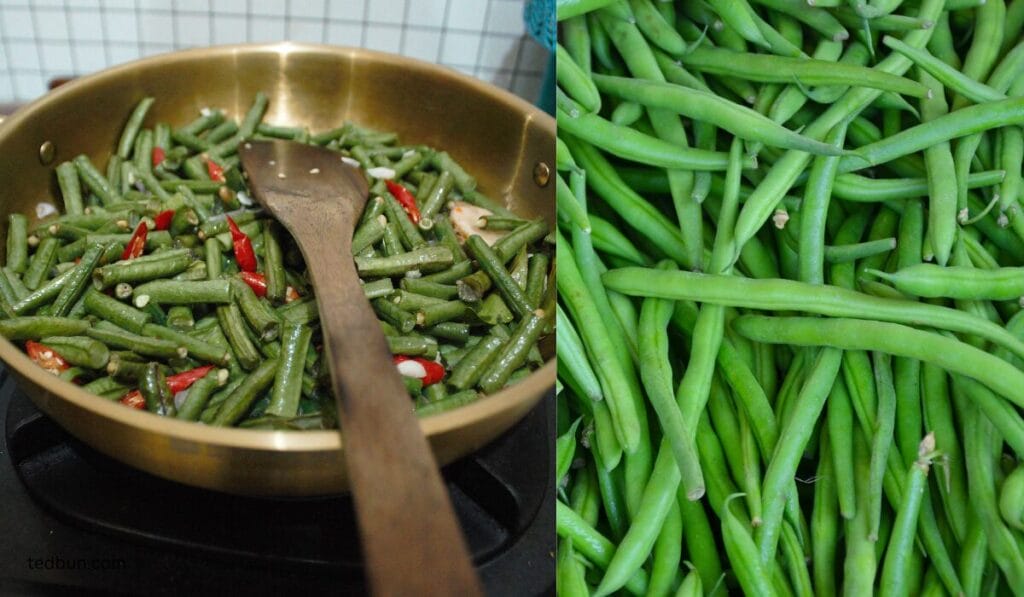
Preparing Green Beans for Rabbits
Getting green beans ready for your bunny is simple but important. I rinse mine under cold water to remove rabbit food pesticides. Trim the ends—they’re tough for rabbits to chew. Chop them into small pieces for easy rabbit food digestion. Organic or rabbit food non-GMO beans are best to avoid chemicals. I once grabbed non-organic beans, and Thumper got a tummy ache. Rabbit food washing is key to rabbit food hygiene. Store them in the fridge to maintain rabbit food freshness and avoid rabbit food spoilage.
Can Rabbits Eat Green Bean Plants or Pods?
Green bean pods are okay for rabbits, but the plants? Not so much. I learned this when Thumper sniffed my garden. Pods are edible in small amounts, similar to the beans themselves. They’re part of rabbit-safe vegetables but still need moderation. The leaves and stems, though, can be risky. Some plants have toxins or are too fibrous, causing rabbit digestive issues. A 2020 YouTube guide from a rabbit expert warned against feeding garden plants without checking first. Always ensure rabbit food safety by sticking to known rabbit-friendly vegetables.
Comparing Green Beans to Other Vegetables
Green beans are tasty, but they’re not the top pick for a rabbit diet. Leafy greens like romaine or parsley are better staples. Green beans have more rabbit food sugars than kale, which can upset rabbit food metabolism if overfed. Parsley offers more rabbit food calcium for bones. I mix green beans with other fresh vegetables for Thumper’s rabbit food variety. A 2024 study from RabbitsAdvisor.com shows leafy greens provide 3–5g of fiber per 100g, beating green beans’ 2.7g. Prioritize these for a solid rabbit diet balance.
Vegetables to Prioritize Over Green Beans
Kale and cilantro are superstars in a rabbit food list. They’ve got more rabbit dietary fiber and fewer rabbit food sugars than green beans. Kale packs 4.1g of fiber per 100g, great for rabbit digestive health. Cilantro is gentler on the tummy too. I give Thumper kale daily but save green beans for special days. These rabbit-safe vegetables support rabbit food absorption and keep energy steady. Green beans are fun, but they play second fiddle to these nutrient champs.
| Vegetable | Fiber (g/100g) | Sugar (g/100g) | Best Use |
|---|---|---|---|
| Green Beans | 2.7 | 3.3 | Occasional treat |
| Kale | 4.1 | 0.8 | Daily staple |
| Cilantro | 2.8 | 0.9 | Daily staple |
Common Myths About Rabbits and Green Beans
Some folks think green beans are a must-have for rabbits. Nope! I fell for this too, thinking Thumper could eat them daily. Green beans aren’t a staple—they’re rabbit treats. Another myth is that they’re harmful. Not true if you follow a rabbit feeding guide. They’re safe in moderation. NewLifeOnAHomestead.com busts the myth that green beans cause instant tummy trouble, as long as you don’t overfeed. Stick to rabbit food moderation to avoid rabbit food intolerance.
Signs Your Rabbit Enjoys Green Beans
Thumper goes wild for green beans, chomping them like they’re candy. If your bunny eagerly nibbles or does a happy hop, they probably love them too. Watch for playful chewing or quick eating—these show they enjoy rabbit-safe foods. I always check Thumper’s reaction to new treats. If he’s extra bouncy, it’s a hit. But keep portions small to avoid rabbit food allergies. Observing these signs helps you tweak their rabbit feeding schedule for joy.
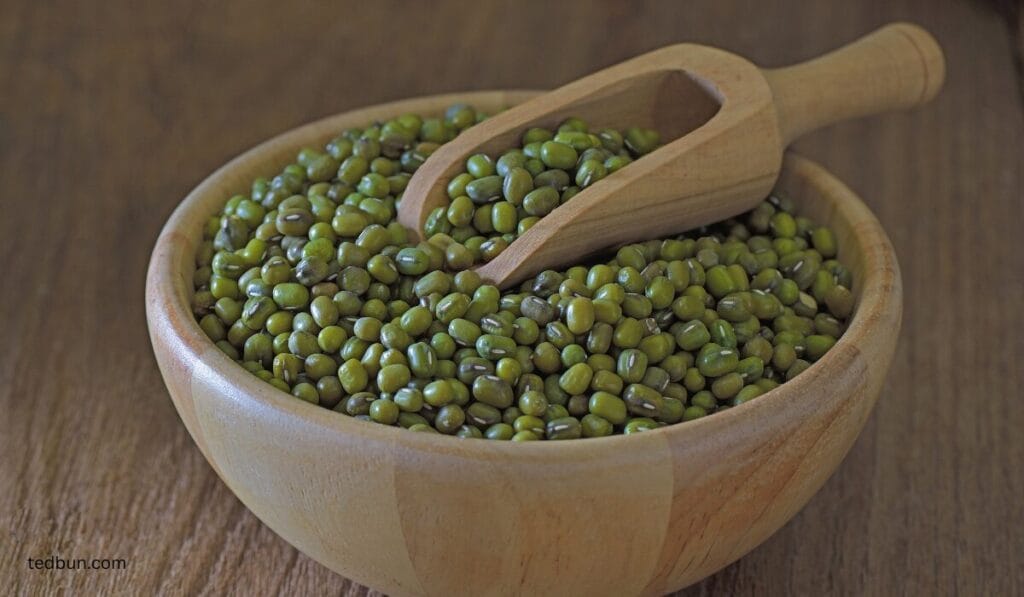
When to Avoid Feeding Green Beans
Some bunnies shouldn’t touch green beans. If your rabbit has a sensitive tummy or past gastrointestinal stasis, skip them. I had a friend whose bunny, Fluffy, got sick from beans due to a weak rabbit digestive system. Rabbits with rabbit food allergies or chronic rabbit digestive issues need a stricter rabbit diet plan. Always check with a vet before adding new rabbit food recommendations. This keeps your bunny safe from rabbit food digestion problems.
Consulting a Vet for Dietary Changes
Before you ask, “Can rabbits eat green beans?” talk to a vet. I did this with Thumper when he had tummy troubles. Vets know rabbit food veterinarians’ advice and can spot issues like rabbit food intolerance. They’ll guide you on safe rabbit food introduction, especially for bunnies with special needs. A quick chat can prevent rabbit health problems. The ASPCA recommends vet consults for any rabbit diet changes to keep things smooth.
Green Beans and Rabbit Dental Health.
Rabbits’ teeth never stop growing, so chewing is key. Green beans’ crunch helps wear down those chompers, supporting rabbit health. I notice Thumper’s teeth stay in check when he munches on them. Hay is still the top choice for rabbit dietary fiber and dental wear, but green beans add variety. Compared to carrots, they’re less sugary, which is better for rabbit food metabolism. Just ensure proper rabbit food portion size to avoid overdoing it.
Environmental Factors in Feeding Green Beans
Where your green beans come from matters. I buy rabbit food organic beans to avoid rabbit food pesticides. Non-organic ones might have chemicals that upset rabbit food digestion. Local, rabbit food seasonal beans are fresher and often cheaper. I check rabbit food labels for rabbit food certifications to ensure quality. Storing them right prevents rabbit food spoilage. PawMaw.com stresses using rabbit food non-GMO sources for bunny safety.
Green Beans in a Balanced Rabbit Diet
A rabbit diet is like a puzzle, and green beans are just one piece. Hay is the backbone, making up 80% of a hay-based diet. Pellets and fresh vegetables like leafy greens fill the rest. I give Thumper green beans as a treat, not a main course. This rabbit diet balance keeps his rabbit food nutrients in check. Mix in rabbit-friendly vegetables like cilantro for variety. A balanced rabbit feeding schedule prevents rabbit food calories from piling up.
Sample Weekly Rabbit Feeding Plan
Planning Thumper’s meals is fun but tricky. Monday, he gets hay, pellets, and kale. Tuesday, I toss in a green bean treat. Wednesday, it’s parsley and hay. This rabbit meal planning keeps his rabbit food variety high. Green beans show up twice a week, max, to avoid rabbit food sugars overload. I follow a rabbit feeding guide to ensure rabbit diet recommendations are met. This keeps his rabbit food energy steady and his tummy happy.
Surprising Facts About Green Beans and Rabbits
Green beans have some cool secrets. Did you know their rabbit food water content, about 90%, helps keep bunnies hydrated? I was shocked to learn old-time farmers used green beans as a cheap rabbit treat. They’re low in rabbit food calories, around 31 per 100g, making them a light snack. Their rabbit food pH level is neutral, gentle on tummies. These rabbit nutrition facts make green beans a sneaky way to add rabbit food hydration without overloading on rabbit food sugars.
Conclusion
So, /can-bunnies-eat-bean-sprouts-a-simple-guide-for-rabbit-owners Yep, but with care. They’re a tasty treat packed with rabbit food vitamins and fiber, but too many can cause tummy troubles. I’ve learned with Thumper that small portions, proper prep, and a vet’s advice keep things safe. Mix green beans into a hay-based diet with other rabbit-safe vegetables for a happy bunny. Think about your rabbit’s needs, and you’ll see how little changes make a big difference in their health.
Frequently Asked Questions
Can Rabbits Eat Uncooked Beans?
Uncooked green beans are safe for rabbits in moderation, but other raw beans like kidney or broad beans are toxic and should be avoided due to harmful compounds.
Can Rabbits Eat Green Peas?
Green peas can be fed to rabbits sparingly as a treat due to their high sugar content, but they should not be a regular part of the diet to avoid digestive issues.
Can Rabbits Eat Boiled Eggs?
Rabbits are herbivores and cannot eat boiled eggs or any animal-based foods, as these can cause severe digestive problems and are not nutritionally suitable.
Can Rabbits Eat Onions?
Onions are toxic to rabbits, causing potential blood disorders like hemolytic anemia; they should never be fed in any form, including green onions.
Are Raw Green Beans OK?
Raw green beans are safe and preferred for rabbits, provided they are fresh, washed, and given in small portions to prevent digestive upset.
Can You Digest Green Beans?
Rabbits can digest green beans in small amounts, but overfeeding may lead to gas or bloating due to their legume nature; humans digest them more easily.
Are Raw Green Beans Safe for Birds?
Raw green beans are generally safe for many birds in moderation, but suitability varies by species, so consult a vet for specific bird dietary needs.
What Is a Bunny’s Favorite Human Food?
Rabbits often enjoy human foods like carrots or apples as treats, but these should be given sparingly due to high sugar content; they remains their favorite staple.
Is Milk OK for Rabbits?
Milk is not safe for rabbits after weaning, as they lack the enzymes to digest lactose, which can lead to diarrhea and digestive discomfort.
Can Rabbits Drink Hot Water?
Rabbits should not drink hot water, as it can cause discomfort or burns; provide clean, room-temperature water to ensure their safety and hydration.
